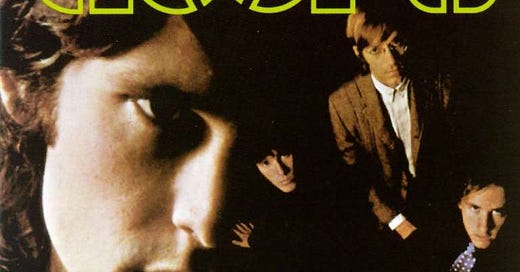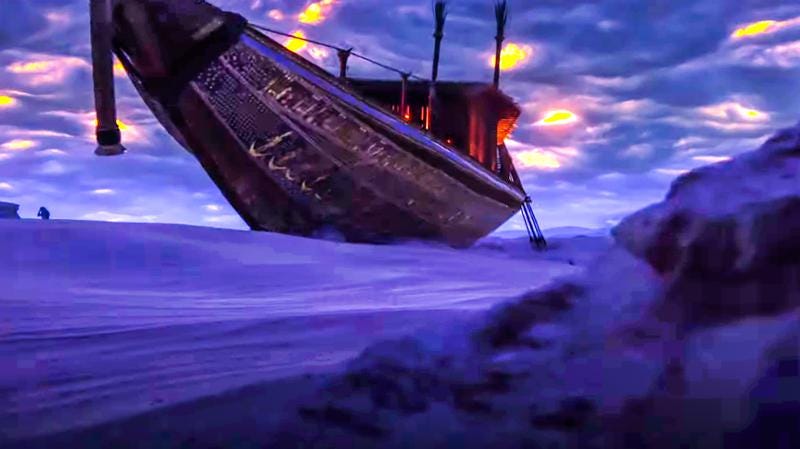Saigon... shit;
I'm still only in Saigon
Captain Benjamin L. Willard - Apocalypse Now (1979)
You can hear it already, can’t you? The thrum of a helicopter’s rotor dissolving into the whirring of the ceiling fan in Willard’s room.
Let’s give the people what they want;
This newsletter is, ultimately, about endings. While we have looked at some more existential takes on ultimate ends, such as Radiohead’s ‘Videotape’, David Bowie’s ‘I Can’t Give Everything Away’, Joy Division’s ‘Decades’ and R.E.M.’s ‘Find The River’ none have married up that subject matter with the scale and enormity we get from Prince’s ‘Purple Rain’, The Stone Roses ‘I Am The Resurrection’, The Rolling Stones’ ‘You Can’t Always Get What You Want’ or The Who’s ‘Won’t Get Fooled Again’.
Closing1 their 1967 self-titled debut album, The Doors do manage to do both with ‘The End’. Like the use in Apocalypse Now, we must contemplate both endings and a beginning.
So we should start at the beginning - Jim Morrison is writing a break-up song after his split from beauty queen Mary Werbelow - all those elaborate plans for their future are gone. We get one of the first lines that could mean something else early on. If it’s a breakup song, then lamenting you’ll never look into someone’s eyes again makes a lot of sense. You might never see them again, or you might never be able to look them in the eye2 - both slightly different. That line also makes sense if they are dead, or you are dead, or everyone is dead.
After that, we get a little deeper. There are allusions to Morrison’s interest in Friedrich Nietzsche, and overcoming a “Roman wilderness of pain” sounds like it ties in with some of his arguments around triumph over adversity. After this section, we move on to American Colonialism and the dash for gold towards the end of the 19th Century as The USA expanded westward. Morrison sings of the King’s Highway - El Camino Real - that runs along the Californian coast. We can take “The west is the best” as a shout-out to the Golden State and the belief that latter-day Capitalist democracy is the best system of Government and society. Alternatively, it is just a reflection that Morrison spent most of his time in LA and liked it!
A change of direction sees us boarding a blue bus - this does sound like a further California development - with a bunch of hippies boarding a Mystery Machine-like vehicle. Or we could get deeper and think of the west as the place the sun goes to die each day, and the blue bus might be the Solar barque - ships used by sun god Ra in ancient Egyptian mythology. The one used in the last couple of episodes of Marvel’s Moon Knight.
Other interpretations are that the blue bus is a Vietnam induction vehicle because, as Andrew Collins says in his review of this track;
It’s not about the Vietnam War, but it’s 1967 and everything’s about the Vietnam War, man.
You'd see how that fits with loss, confusion and the unknown themes.
One interesting element of ‘The End’ is, what does it sound like? I guess it is psychedelic rock - something that would be quite fashionable for the rest of 1967.3 You could argue that it goes hard but not in a yet-to-be-invented Black Sabbath way. Some have even argued it is an early Gothic song. For me, though, the most critical element is the Indian classical sound of the record. Like The Rolling Stones and The Beatles had explored in 1966, there was a growing fascination with the sounds and the philosophies of the region, and The Doors were interested in both.
Guitarist Robby Krieger is using a tuning that he picked up from Ravi Shankar’s music lessons to ape the sound of a sitar, Ray Manzarek’s organ is doing the job of a tambura, and John Densmore’s drums are played more like a tabla than the type of drums you’d associate with rock music at the time. All of this gives the early parts of the song space and room to breathe before things get heavier and heavier.
The song is already fairly long4 at this point, around six minutes, to get to the section about the blue bus. From here, we get to the song’s infamous conclusion.
The band regularly played at the bar The Whisky a Go Go on Sunset Blvd, to the extent they were the house band. This changed on 21st August 19665 - Morrison seemed to miss the gig as he’d allegedly taken 10,000 micro-grams of LSD. The band dragged him to it, and just as the acid hit, he brought the song from the end of the gig to the middle. He started improvising over the band’s loose jamming about a killer walking down a hallway before riffing on Oedipus Rex, the Greek myth in which the King of Thebes fulfils a prophecy of murdering his father and marrying his mother. (“Who pays for that wedding?” - Homer Simpson, 2001).
By the time Morrison is singing "Mother? I want to..." at the Whisky a Go Go, two things have happened. Firstly, the band are no longer the house band at the bar. Secondly, the band have descended into a cacophony of loose rhythms, and by now, Morrison is machining gunning the f-word to the audience with staccato bravado.
Three days later, with Morrison again out of his tree, they committed the song to tape - through they buried a lot of the outro’s swearing reasonably deep into the mix.
Morrison said of the song in 1968 that the connection to Oedipus is not as direct as it may seem.
“Yeah, I’d say there was a similarity, definitely… But to tell you the truth, every time I hear that song, it means something else to me. I really don’t know what I was trying to say. It just started out as a simple goodbye song…Probably just to a girl, but I could see how it could be goodbye to a kind of childhood. I really don’t know. I think it’s sufficiently complex and universal in its imagery that it could be almost anything you want it to be.”
Apocalypse Now finishes with the song played out again, and like the film, the song ends where it starts, with a refrain of the opening lines. Like Ouroboros consuming its tail.
The Doors were also quite literal on their other 1967 album, Strange Days, which finishes with the song ‘When The Music’s Over’.
There is a different path to look into here, as blindness is an essential theme in the Greek play Oedipus Rex. A play that might get mentioned later on!
The album was released in early Jan-67.
The song he's long, eleven minutes.






There’s a strange and scary gush of elevated volume when Ray Manzarek first hits the keys. I listen for that part every time
I’ve heard this song so many times and it’s a slow slither from one vibe to another. It’s feel very much like Morrison traversing his thoughts and consciousness. It brings so many elements central to the band and their innovation.